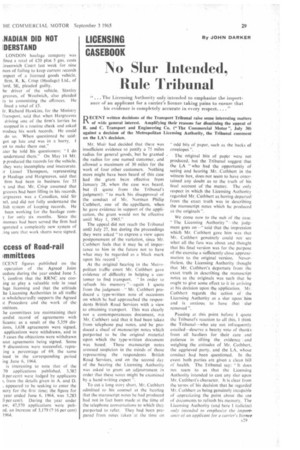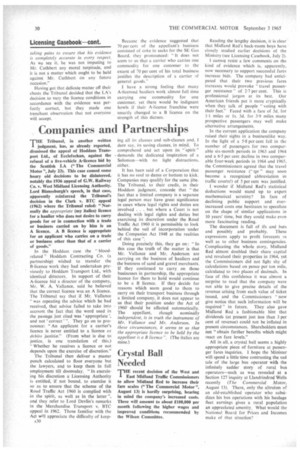N o Slur intended,
Page 31

Page 32

If you've noticed an error in this article please click here to report it so we can fix it.
Rule Tribunal
The Licensing Authority only intended to emphasize the importance of an applicant for a carrier's licence taking pains to ensure that Isis evidence is completely accurate in every respect...."
RECENT written decisions of the Transport Tribunal raise some interesting matters IA of wide general interest. Amplifying their reasons for dismissing the appeal of R. and C. Transport and Engineering Co. ("The Commercial Motor ", July Mil against a decision of the Metropolitan Licensing Authority, the Tribunal tomment on the LA's decision.
Mr. Muir had decided that there was insufficient evidence to justify a 75 miles radius for general goods, but he granted the radius for one named customer, and allowed a maximum of 30 Miles for the work of four 'other customers. Nothing more might have been heard of this case had the grant been effective from January 28, when the case was heard, but (1 quote from the Tribunal's judgment): "to mark his disapproval of the conduct of Mr. Norman Philip Cuthbert, one of the appellants, when he gave evidence in support of the application, the grant would not be effective until May 1..1965."
The appeal did not reach the Tribunal until July 27, but during the proceedings they were asked " to express a view upon postponement of the variation, since Mr. Cuthbert feels that it may be of importance to him in the future not to have what may be regarded as a black mark upon his record ".
At the original hearing in the Metropolitan traffic court Mr. Cuthbert gave evidence of difficulty in helping a customer to find transport, " In order to refresh his memory "-again t quote from the judgment • " Mr. Cuthbert produced a type-written note of occasions on which he had approached the respondents British Road Services with a view to obtaining transport. This was clearly not a contemporaneous document, out Mr. Cuthbert said that it had been taken from telephone pad notes, and he produced a sheaf of manuscript notes which purported to be the original material upon which the type-written document was based. • These manuscript notes aroused suspicion in the minds of those representing the respondents British Road Services, and on the second day of the hearing the Licensing Authority was asked to grant an adjournment in order that these notes might be examined by a hand-writing expert ".
To cut a long story short, Mr. Cuthbert admitted to his counsel at the hearing that the manuscript notes he had produced had not in fact been made at the time or the telephone conversations to which they purported to refer. They had been prepared from notes taken at the time on odd bits of paper, such as the backs of envelopes ".
The original :bits of palier were not produced, but the Tribunal suggestthat the LA who had the opportunity of seeing and hearing Mr. Cuthbert in the witness box, ddesmot seenn to have entertained any' doubt as to the truth of his final account of the matter. The only respect in which the Licensing Authority regarded Mr. Cuthbert as having departed. from the exact truth was in describing the manuscript notes which he produced as the originals ".
We come now to the nub of the case. "The Licensing Authority -the judgment goes on—" said that the impression which Mr. Cuthbert gave him was that Mr. Cuthbert genuinely could not see what all the fuss was about and thought that his final version was for the purpose of the exercise a sufficiently close approximation to the original version. Nevertheless. the Licensing Authority thought that Mr. Cuthberes departure from the exact truth in describing the manuscript notes as the originals was such that he ought to give some effect to it in arriving at his decision upon the application, Mr. Cuthbert regards the action of the Licensing Authority as a slur upon him and is. anxious to . have that slur removed ".
Pausing at this point before I quote the Tribunal's reaction to all this, I think the Tribunal—Who are not infrequently assailed—deserve a hearty vote of thanks from all hauliers for their care and patience in sifting the evidence and weighing the attitudes of Mr. Cuthbert, the aggrieved party, and the LA, whose conduct had been questioned. In the event both parties are given a clean bill of health. The Tribunal say: " It does not seem to us that the Licensing
• Authority intended to cast any slur upon Mr. Cuthbert's character. It is clear from the terms of his decision that he regarded Mr. Cuthbert as being genuinely incapable of appreciating the point about the use of documents to refresh his memory. The Licensing Authority (and here I italicize) only intended to emphasize the importance of an applicant for a carrier's licence
taking pains to ensure that his evidence is completely accurate in every respect. As we see it. he was not imputing to Mr. Cuthbert any moral turpitude, and it is not a matter which ought to be held against Mr. Cuthbert On any future occasion."
Having got that delicate matter off their chests the Tribunal decided that the LA's decision to vary the licence conditions in accordance with the evidence was perfectly correct, but they made one trenchant observation that not everyone will accept.
Because the evidence suggested that 70 per cent of the appellant's business consisted of coke in sacks for the SE Gas Board, they pronounced: " It does not seem to us That a carrier who carries one commodity for one customer to the extent of 70 per cent of his total business justifies the description of a carrier of general goods."
I have a strong feeling that many A-licensed hauliers work almost full time carrying one commodity for one customer, yet there would be indignant howls if their A-licence franchise were smartly changed to a B licence on the strength of this dictum.




























































































































































